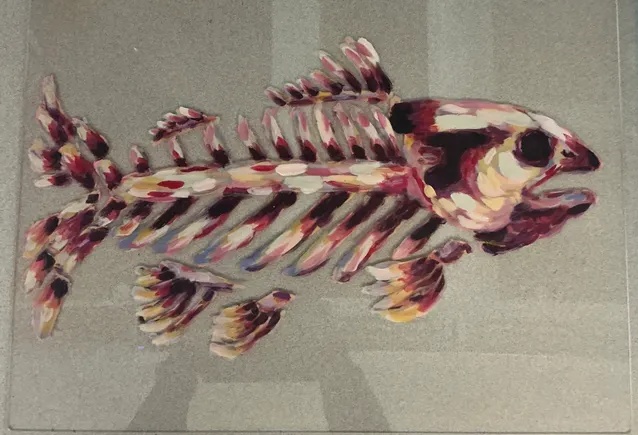
The Turritopsis dohrnii is a species of jellyfish among the very few of Earth’s animals that are considered biologically immortal. After reaching sexual maturity, and if injured, sick, or old, T. dohrnii is able to revert to the polyps colony stage of life from which it was born. The polyps then splits into several genetically identical clones of the original jellyfish and those clones are, technically, an extension of its life.
She has been floating, bobbing through currents, too tiny to be hunted, for more than two months before she finds the green monument — it is half-buried in the sea floor, its front limb raised in a solemn salute.
She pokes around exhaustedly with her tentacles for a bit. She hasn’t had a good meal in weeks. The plankton patches in these parts are lacking, to say the least; they taste of deep dark oil and something more bitter that she doesn’t recognize. She flounces, weary, over to the monument, through the spikes protruding upwards from the statue’s head, all the while hungrily searching the water around her. Slowly, she begins to cross the vast surface of the green thing’s unsmiling gorgeous face.
She stops midway through at its left nostril when the fatigue sets in once again, her little bell deflating slightly. Her tentacles, though, explore the hidey-hole, and they settle upon a tiny clutch of eggs. But something’s already been here — there’s less than ten left. She quickly scoops them into her mouth and finds that they give her the tiny boost she needs to reach that round green chin. But when she reaches it, that energy runs out. She feels herself begin to sink lower with each opening of her bell, hunger pains rearing their ugly head anew. Her gelatinous body begins to quiver.
It had happened only once before. That first time, she was only two weeks old, unfamiliar with the shallow tide pool she’d somehow wound up in, helpless as she washed up onto the shore. She sank, gurgling into the wet sand until she was an unrecognizable lump. She could feel the pieces of her body mashing themselves against one another, folding, changing, desperate to preserve themselves by melting into anything close enough to touch. Here, though, is where her memory sometimes fails her — there’s a hazy recollection of feeling terrifyingly unbound, as if her deconstructed flesh would stop holding itself together at any moment. Then there is nothing but thick darkness for two days.
She awoke younger.
It was unclear, at first, what exactly felt so different. Because something was different. Her reflection caught her eye, staring up at her from the smooth shiny rock she had collapsed on. She was nowhere near the shore.
Her delicate tentacles glowed ivory in the beaming sun that penetrated the water. A warmth she hadn’t felt in two weeks pooled in her center, scarlet burning in her chest, veins pumping faster and faster until suddenly she burst upward. She had been confused when she saw how close she still was to the rock. A good push of her bell like that normally would’ve taken her twice as far. And something else was different, too. She felt split, somehow. As if she had only a fraction of the body she’d had before. She had examined her tentacles — shorter. Less powerful. It was the same body she’d had two weeks before. Flashes, now, began to come back to her; dragging herself across the ocean floor when the tide was high, weakly attempting to get caught in the current and brought out to sea. She’d been reborn.
She’d once seen it happen to another, when she was only a newborn; the throes of death sapping him of his strength, leaving him to gather dust in between sprouts of seagrass. She’d watched his body for a while. He’d devolved into a blob — easy to miss, lying stagnant — before sprouting again into several new little jellies.
Now, beside the enormous monument, she feels the whole thing begin to happen to her again. She hadn’t been sure, even, if it could be repeated at all. How many times could one conceivably split before there was nothing left? But her soft head hits the sand, and she recognizes that dense darkness clouding her vision, and her ever-grasping tentacles start to slow, and her hunger is muffled by that nothingness that is once again approaching.
In the anticipatory silence before it overtakes her entirely is the looming stone face of the statue. It’s green as it ever was. It doubles and triples in her field of vision until it seems somehow to have volunteered as her guardian, lips pressed tightly together with worry, one raised arm extending outwards as if to catch her.